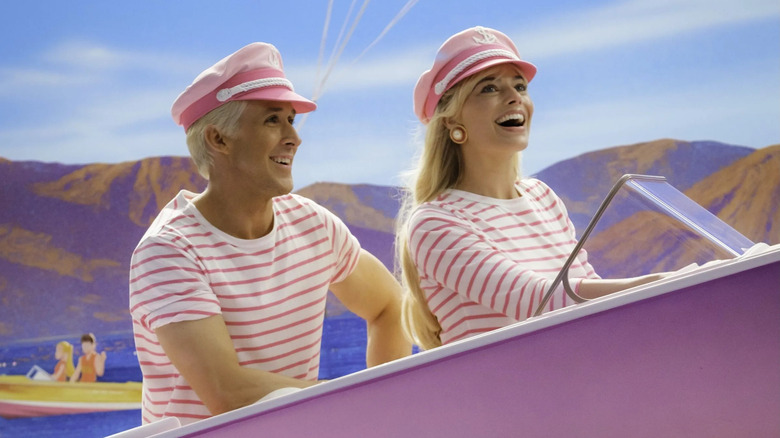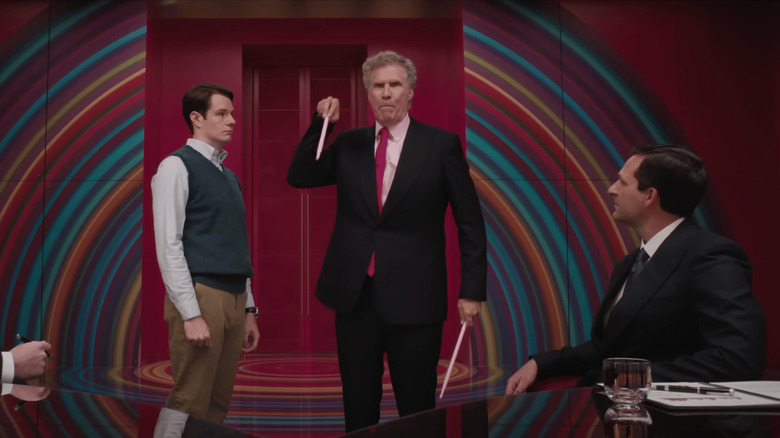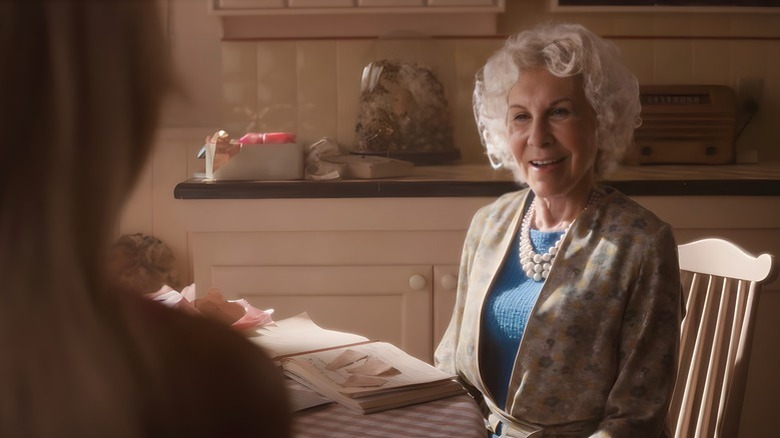Greta Gerwig's Barbie Movie Bites The Hand (Conglomerate) That Feeds It
This article contains spoilers for "Barbie."
The first live-action movie based on Mattel's Barbie dolls could have easily been a cash grab: just another soulless vehicle for merchandise to fly off the shelves. But writer and director Greta Gerwig looks at the cultural impact of this mammoth intellectual property with a complexity and depth that subverts audiences' expectations.
While Mattel's endorsement is clear — like the sequences where the camera freezes on Barbie's outfit products and their names — Gerwig is not afraid to critique the fantasy we've bought from them. Together with co-writer Noah Baumbach, she pokes fun at the company's controversies and missteps while bringing Barbie and her world to life. Mattel's CEO Ynon Kreiz told Variety that he supports the corporation's zany portrayal:
"There are so many elements of humor and self-deprecation in the movie. And we embrace that. We take our brands very seriously. We take what we do very seriously. But we don't take ourselves too seriously."
What separates "Barbie" from other IP-driven blockbusters is that it is not afraid to question or lampoon the consumerist machine behind the iconic toy. Gerwig creates a bold and clever film that is more than just a hollow, commercial project, but something that explores both the highs and lows of Barbie's evolving journey with Mattel.
An all-male board of bumbling idiots
"Barbie" imagines Mattel as another piece of the patriarchy that defines the Real World. The company is housed in a giant, phallic building that is cold and sterile inside. The only colors are black, gray, and white. Endless rows of small cubicles confine unhappy, lower-level employees while the executives brainstorm on the "all the way up" floor. Their boardroom has pink and rainbow colors with a giant, heart-shaped table in the middle. However, this cutesy decor is as close as they get to understanding their predominantly female consumers.
All of the Mattel workers are men, except for Gloria (played by America Ferrera), who sits unhappily at her desk sketching her own unique Barbie designs. Their leader, an unnamed "Mattel CEO" played by Will Ferrell, is a bumbling idiot and the rest of his loyal, male suits follow his every move like brainless toy soldiers. Gerwig's "Barbie" suggests that Mattel only has foolish men in charge. They commodity girlhood with little knowledge or authority on what girls actually enjoy. Even Barbie wonders why there are little to no female CEOs or workers there.
Throughout the film, we see many of Mattel's strange or failed ventures — including a Barbie with a built-in video camera, Tanner the pooping dog, and Allan — suggesting that these men will do anything to try and make money, even if it's a ridiculous idea. They also attempt to put Barbie back into her box and stifle her dreams of becoming more independent. It's not the most flattering portrait of the business, and Margot Robbie was surprised that Mattel agreed to be depicted in such an absurd and self-deprecating way.
A touching tribute to Barbie's creator
One of the more positive depictions of Mattel includes Rhea Perlman as Ruth Handler, the co-founder of the company and inventor of the Barbie doll. While the circumstances behind her appearance are silly (she's a ghost who has been maintaining an office on the 17th floor) Handler's final scene with Barbie is aptly described by /Film's own BJ Colangelo as "one of the most powerful moments of the film."
Gerwig does not shy away from the details of Handler's past as she references her double mastectomy, tax evasion issues, and troubles with the IRS. In 1973, Handler's medical complications led to her resigning from her position as president. She proceeded to manufacture prosthetic breasts for her new company Ruthton Corporation. In 1978, she was charged with fraud and false reporting to the Securities Commission, then had to pay a fine of $57,000 and complete 2,500 community service hours (per The Guardian).
Handler exudes a maternal warmth that is vitally comforting when Barbie faces an existential crisis about her life's meaning. She insists that Barbie is not limited to a particular ending and encourages her to carve her own path. Despite its satirical tone, "Barbie" concludes with a sweet and sincere representation of Mattel's most important figure.


